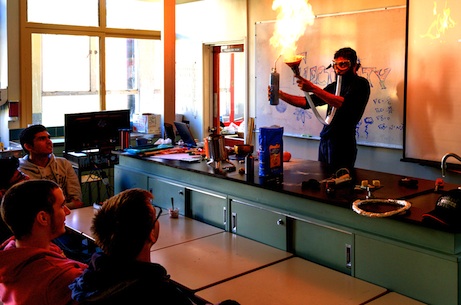
Gates Cambridge Alumnus Niraj Lal wins prestigious award in Australia for his research and science communication work.
A Gates Cambridge alumnus has won a prestigious Australian award for his research on renewable energy and for exceptional initiative in science communication.
Niraj [Nij] Lal [2008], who did a PhD in Physics at the University of Cambridge, has won the 2013 Australian Capital Territory Young Tall Poppy Science Award and The Australian National University Medal for the ACT Young Tall Poppy of the year.
The Tall Poppy Award, awarded by the Australian Institute of Policy and Science, recognises his outstanding contributions to science and his efforts to encourage young Australians to follow in the footsteps of outstanding achievers.
Nij was praised for his research in nanophotonics, photovoltaics and renewable energy and his science communication skills. He regularly presents public show ‘The Science of Electricity’ at ANU, Questacon [the National Science and Technology Centre in Australia], high-schools across the region and for the University of the Third Age, a continuing-education university for older people.
He was awarded a 2013 National Science Week grant to develop a show about the science of light for high school students and was also invited to be one of 100 scientists from Canberra to speak at Questacon as part of its 100°C centenary celebrations.
“It’s lovely to receive an award for research and science communication. For me, the best bit isn’t the gong itself, but the support for doing science communication. I love it, and reckon it’s super important for academia to do,” said Nij, who is currrently a Postdoctoral Fellow at the Research School of Engineering of the ANU.
Nij’s devotion to the public communication of science began early. At Cambridge he was awarded a UK Student Volunteering Gold Award from the Office of External Affairs at the University of Cambridge for his public outreach work.
For several years Niraj performed a lecture on The Science of Electricity for a wide range of Cambridge audiences including ethnic minority summer schools, in-care students, village colleges, mature-age students, international summer schools and the general public.
He has also volunteered at the Wysing Arts Centre helping disadvantaged students from Cambridgeshire produce a film about ‘Science of the Future’, worked with the BBC Radio Naked Scientists on the science of solar energy and volunteered at the Royal Society Science Exhibition in London.
Watch Nij’s interview on Youtube here.












